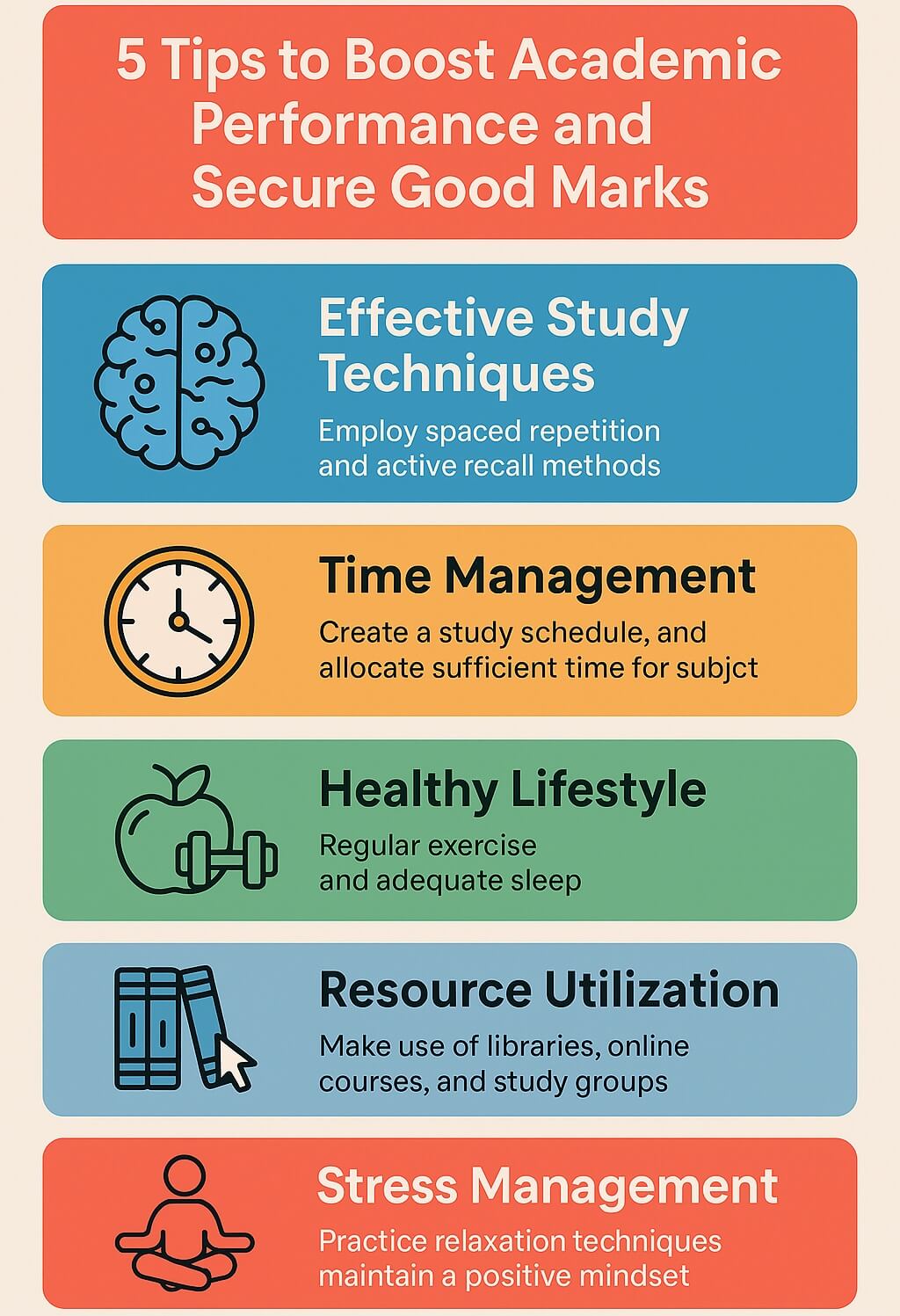
Getting good marks doesn’t come from luck. It comes from planning, consistent effort, and smart techniques. Many students spend hours studying but still feel stuck when results don’t match their hard work. That’s frustrating, right? But the problem often isn’t effort—it’s the method.
Academic performance depends on more than how long you study. It’s about how well you manage time, understand your goals, take care of your health, and stay consistent. Based on research, expert opinions, and proven study strategies, here are five reliable tips that can help you perform better and get higher grades—without burning out.
Table of Content
- Know What’s Holding You Back
- Tip 1: Create a Personalized Study Plan
- Tip 2: Use Active Learning Techniques
- Tip 3: Remove Distractions and Improve Focus
- Tip 4: Take Care of Your Body and Mind
- Tip 5: Reflect, Review, and Get Feedback
- Real-Life Examples and Case Studies
- Conclusion
- Frequently Asked Questions (FAQs)
Know What’s Holding You Back
Before changing anything, figure out what’s not working. Are distractions eating up your time? Are you rereading notes instead of actively testing yourself? Maybe you feel anxious and unmotivated.
According to the Pew Research Center, over half of students report feeling “busy but unproductive.” That gap between effort and outcome is usually a sign of ineffective habits—not laziness. So, the first step is awareness. Once you know the obstacle, you can work around it.

Tip 1: Create a Personalized Study Plan
Set Clear, Measurable Goals
Studying without goals is like driving without a map. You're moving, but not going anywhere specific.
Try setting goals using the SMART method:
-
Specific: “I want to raise my math grade to 85%”
-
Measurable: “I’ll track quiz scores weekly.”
-
Achievable: “I’ll study 1 hour daily”
-
Relevant: “Math is needed for my career plans”
-
Time-bound: “I’ll achieve this within the next 2 months”
Goal-setting research from Stanford University found that students who set specific academic goals had a 25% improvement in performance within a semester.
Plan Your Week Around Energy, Not Time
Time management doesn’t mean stuffing your calendar. It means knowing when you focus best.
Try this:
-
Do hard tasks in the morning when your brain is fresh
-
Use evenings for review or light reading
-
Break study blocks into 25-minute chunks with 5-minute breaks (Pomodoro Technique)
-
Use color-coded planners or apps like Notion or Trello
This simple structure helps reduce procrastination and keeps your brain sharp.
Tip 2: Use Active Learning Techniques
Test Yourself, Don’t Just Reread
Rereading feels good but doesn’t help much. Instead, test yourself regularly. This is called active recall.
After studying a topic, close the book and ask:
-
“What did I just learn?”
-
“Can I explain it in simple terms?”
This method helps move information from short-term to long-term memory.
Spaced repetition is another technique: review material at set intervals over time (1 day, 3 days, 7 days). This builds stronger memory.
According to a study by McDaniel and Roediger (2011), students who used active recall and spaced repetition performed 50% better than those who reread notes passively.
Use apps like:
-
Anki (flashcards)
-
Quizlet (custom tests)
-
RemNote (concept linking)
Study with Others for Deeper Learning
Studying in groups can sharpen your understanding—if the group stays focused.
Try this:
-
Take turns explaining topics
-
Quiz each other
-
Solve past papers together
The Feynman Technique encourages teaching others. If you can explain a concept in your own words, you’ve learned it.
Tip 3: Remove Distractions and Improve Focus
Tame Your Tech Habits
Phones and notifications ruin concentration. According to Common Sense Media, students get distracted every 6 minutes while studying.
Want to focus better?
-
Turn off non-urgent notifications.
-
Use apps like Forest or Focus Keeper to stay on task
-
Keep your phone in another room during study sessions
You don’t need to quit tech, but use it wisely.
Design a Study-Friendly Space
Your environment matters. A messy, noisy room can stress you out and make focusing harder.
Here’s how to build a good study zone:
-
Declutter your desk
-
Use natural lighting if possible
-
Play low-volume instrumental music (if it helps you focus)
-
Use a chair that supports your posture
A University of Minnesota study found that students who studied in a clean, organized environment scored 18% higher on standardized tests than those in cluttered spaces.
Tip 4: Take Care of Your Body and Mind
Sleep Fuels Learning
Lack of sleep ruins focus and memory. Skipping sleep to cram might seem helpful, but it ends up hurting your performance.
The National Sleep Foundation recommends 7–9 hours of sleep for students. Research from Harvard Medical School shows that students who sleep well consistently perform 20% better in memory-based tasks.
Simple sleep tips:
-
Sleep and wake at the same time daily
-
Avoid caffeine after 2 PM
-
Don’t study on your bed—train your brain to associate it with rest
Eat Foods That Feed Your Brain
Your brain needs energy to function. Expect brain fog and fatigue if you're running on junk food and energy drinks.
Try eating:
-
Eggs and leafy greens (memory support)
-
Walnuts and fish (omega-3s for brain health)
-
Berries (antioxidants that support learning)
-
Plenty of water
Even mild dehydration reduces memory and focus, according to Harvard Health. Always keep water nearby while studying.
Handle Stress Before It Handles You
Exams, deadlines, and plans can be overwhelming. But stress, when unmanaged, hurts your ability to think clearly.
Simple stress busters:
-
10 minutes of walking or stretching
-
Breathing exercises (4-7-8 method)
-
Journaling or gratitude lists
-
Talking to a trusted friend or mentor
Mayo Clinic research confirms that students who practice daily stress-reduction techniques have better concentration and lower exam anxiety.
Tip 5: Reflect, Review, and Get Feedback
Check Your Progress Weekly
Every week, look back and ask:
-
What worked well?
-
What didn’t?
-
What will I do differently next week?
Tracking your mood and progress can be done using a notebook, calendar, or apps like Daylio. This self-feedback helps you spot patterns and stay on track.
Self-reflection is a habit shared by high achievers. According to the American Psychological Association, students who regularly review their progress stay more motivated and improve quickly.
Ask for Feedback from Teachers
Instead of waiting for your grades, ask:
-
“How can I improve?”
-
“Where did I go wrong on this assignment?”
-
“Can I try another version?”
Teachers appreciate students who take initiative. This shows you’re invested in learning, not just passing.
Common Mistakes That Hurt Academic Results
Some habits look productive but aren’t helpful long-term.
Avoid these traps:
-
Highlighting everything in your book
-
Pulling all-nighters before exams
-
Multitasking with TV or social media
-
Ignoring physical and mental health
-
Studying for hours without breaks
These drain your energy and give poor returns.

Real-Life Examples and Case Studies
Rina, a high school student from Nepal, struggled with long study hours and poor grades. After switching to the Pomodoro method and joining a study group, she improved her science grade from 60% to 82% within one term.
Deepak, a first-year college student, used spaced repetition flashcards and started sleeping earlier. Within two months, his concentration and quiz scores improved noticeably.
Oxford Learning Center reports that students who set daily study goals improved their test scores by 12% in under two months.
Expert Insights and Key Data
-
Dunlosky et al. found that rereading was one of the least effective strategies, while practice testing ranked highest.
-
The Learning Scientists recommend combining active recall with spaced learning for long-term improvement.
-
John Hattie’s Meta-Analysis shows that student self-monitoring ranks high in boosting academic performance.
-
Harvard Health connects hydration, sleep, and nutrition to brain function and memory.
-
Mayo Clinic emphasizes the impact of daily physical movement and stress control on mental clarity.
Summary of Actionable Steps
-
Start with a personalized, flexible study schedule
-
Use active recall and spaced repetition for stronger memory
-
Limit distractions with tech breaks and clean study spaces
-
Sleep enough, eat smart, and manage your stress
-
Reflect weekly and ask teachers for regular feedback
These steps may sound simple, but they work when done consistently. Small changes over time build big improvements.
Conclusion
Academic performance isn’t about being the smartest person in the room. It’s about building the right habits and sticking to them. With a plan, consistent effort, and support from the right techniques, you can reach your goals and even surprise yourself.
Whether you aim for better grades or just want to feel more confident in your learning, these five tips can make a lasting difference. Start small, stay steady, and let your progress speak.
Frequently Asked Questions (FAQs)
1. What’s the best study method for exams?
Active recall with spaced repetition works better than rereading. Test yourself, take breaks, and review often.
2. How many hours should I study each day?
2 to 4 focused hours using the right strategies are more effective than long, unfocused sessions.
3. Is it okay to study late at night?
Studying late isn’t bad if it fits your rhythm, but lack of sleep hurts memory. Try to sleep 7–9 hours consistently.
4. What should I do if I keep forgetting what I study?
Use spaced repetition and teach what you’ve learned. Writing summaries or using flashcards can also help.
5. How can I balance study with other responsibilities?
Use a planner, set realistic goals, and stick to short, focused study blocks to maximize your time.





